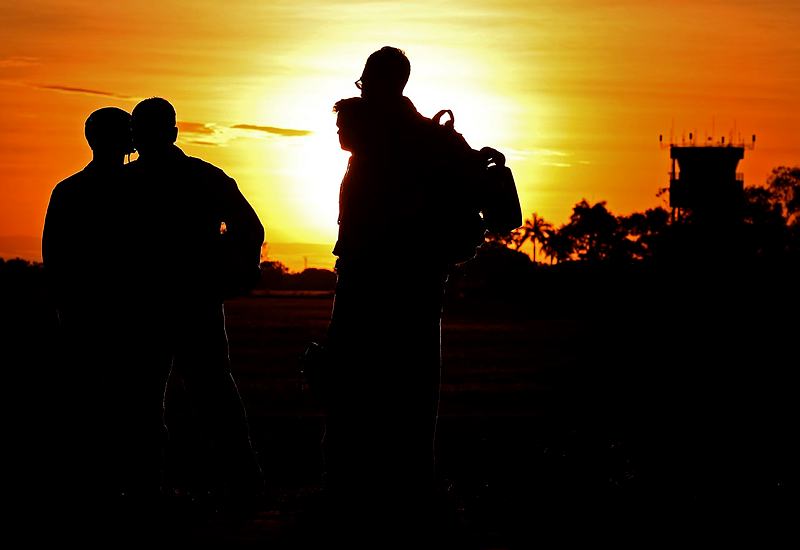
The recent SDSC–CSIS report The ANZUS alliance in an ascending Asia (PDF) makes an interesting argument about the US–Australia alliance becoming a ‘central hub’ for American policy in the Pacific. We explained yesterday why we aren’t sold on the geographic/military disposition aspect of the argument. But alliances aren’t all about warfighting, and there’s also political value in having like-minded countries shoulder-to-shoulder in environment-shaping activities and in helping to underwrite a security order that’s to our liking.
Even so, we’d argue that it’s hard to disentangle the politics from the geography. For the US to assure all of the players in the region that it’s prepared to back the established order and protect the interests of its allies and partners, it needs to have a credible military presence. And if, as we argued yesterday, Australia’s geographic role has diminished in wartime due to modern force projection capabilities, its role in the geopolitics of North Asia in peacetime is even less clear.
In East Asia, Japan remains a strategic hub for the US military, with forces there far outweighing those on Guam, even after the planned relocations are completed. They play a key role, not only in deterring aggression in the East China Sea or the Taiwan Straits, but increasingly for contingencies in the northern part of the South China Sea (SCS). In Southeast Asia, the US depends critically on Singapore, not least as the key local logistics ‘hub’ for the 7th Fleet. Establishing and/or upgrading military facilities in the Philippines, Vietnam and Malaysia would be much more relevant for America’s deterrent and war-fighting posture in Southeast Asia—and thus for its ability to reassure allies—than Australia is.
At a time when those allies and partners in close proximity to China are getting increasingly worried about the credibility of US security assurances, promoting Australia as a ‘central hub’, paradoxically located at the safe(r) Pacific rim, will look more like ‘offshore balancing light’. That is, it’ll look like a decreased US commitment to put its forces into zones within reach of China’s growing military arsenal. ‘Don’t worry guys, we’re staying at arm’s length, but we’ll come in if anything happens’ would be a tough sell in Tokyo or Seoul. American support is much more convincing when there are tens of thousands of troops and hundreds of ships and aircraft in harm’s way. Without them, American influence in the region would decline markedly.
So what role can Australia and ANZUS play? The SDSC–CSIS report recommends that the ‘Alliance should serve as a central hub for Asian regional order and architecture.’ That’s an ambitious objective. The authors suggest that ANZUS could be the ‘hub’ for ‘minilateral’ models of security cooperation to add substance to existing multilateral arrangements. But at its heart, ANZUS is a bilateral defence pact to guard against the possibility of external aggression by a major Asian power (originally Japan, today China). It’s perceived as such in the region and that’ll define the willingness of regional partners to participate in such activities. For instance, Tokyo is interested in Australia–US–Japan security trilaterals precisely because the structure provides an additional layer against an assertive China. We expect other major regional players such as India and particularly Indonesia to be much more reluctant; they don’t want to associate themselves too openly with what’s essentially a Western military alliance, as Beijing is at pains to say.
Whether we like it or not, the future of the ‘Asian regional order and architecture’ will very much be defined by the power plays in the East China Sea and the SCS between China, its neighbours and the US. If ANZUS really seeks to ‘shape’ the geopolitical dynamics in Asia it would need to intensify its activities there, rather than at the periphery through minilaterals. But that would put the Alliance squarely in opposition with China who doesn’t want to be part of an ‘ANZUS-led’ regional order but instead demands its own ‘spheres of influence’.
Australia/ANZUS might be able to make a difference but it doesn’t seem that either Washington or Canberra have a particular appetite to use ANZUS in that way. For instance, it seems that the Obama administration is very reluctant to push back against Chinese assertiveness in the SCS. Likewise, nothing practical seems to have come from the Abbott government’s announcement in June this year that it would conduct ‘freedom of navigation’ exercises to protest China’s ‘land reclamation activities’ in the SCS. Apparently, there haven’t been formal talks within an ANZUS context about such exercises, demonstrating that any latent ANZUS potential to shape events there has been underutilised at best. In this sense, we agree with Hugh White, who argues that the ANU/CSIS report ultimately dodged the issue and failed to address the key question of what exactly the Alliance should do in the face of China’s rise.

